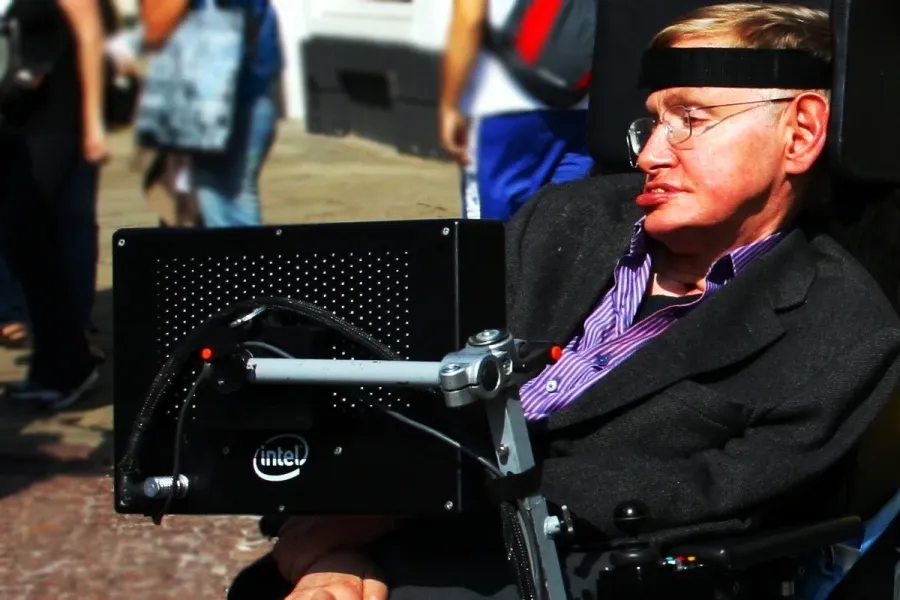Disney Emerges as a New OpenAI Investor
The Walt Disney Company agreed to a $1 billion investment in OpenAI.

Stephen Hawking, the British physicist and black-hole theorist, has died, according to Bloomberg. He was 76.
Hawking died peacefully at his home in Cambridge in England in the early hours of Wednesday morning, a spokesman for his family said in an emailed statement. “We are deeply saddened that our beloved father passed away today,“ his children Lucy, Robert and Tim said in the statement. “He was a great scientist and an extraordinary man whose work and legacy will live on for many years. His courage and persistence with his brilliance and humor inspired people across the world. He once said, ‘It would not be much of a universe if it wasn’t home to the people you love.’ We will miss him forever.“
Hawking suffered from amyotrophic lateral sclerosis, also known as Lou Gehrig’s disease, and was confined to an electric wheelchair for much of his adult life. Diagnosed at age 21, he was one of the world’s longest survivors of ALS. Hawking redefined cosmology by proposing that black holes emit radiation and later evaporate. He also showed that the universe had a beginning by describing how Albert Einstein’s theory of general relativity eventually breaks down when time and space are traced back to the Big Bang about 13.7 billion years ago.
“A Brief History of Time,“ first published in 1988, earned its author worldwide acclaim, selling at least 10 million copies in 40 languages and staying on the best-seller list of the U.K.’s Sunday Times newspaper for a record 237 weeks. Often referred to as “one of the most unread books of all time“ for the hard-to-grasp concepts, it included only one equation: E = mc2 or the equivalence of mass and energy, deduced by Einstein from his theory of special relativity. The book outlined the basics of cosmology for the general reader.
Hawking’s fame increased as his health worsened. After his degenerative muscle disorder was diagnosed, he defied medical opinion by living five decades longer than expected. He communicated his ideas through an American-accented speech synthesizer after a life-saving tracheotomy in 1985 took away his ability to speak. To the layman, the robot-like voice only seemed to give his words added authority.
The Nobel Prize in Physics proved elusive for Hawking, whose theories required observational data to win the praise of the awarding committee in Stockholm. The Nobel Foundation excludes posthumous nominees.
Stephen William Hawking was born in Oxford, England, on Jan. 8, 1942, exactly 300 years after the death of Italian physicist Galileo Galilei. Hawking’s father, Frank, was a doctor of tropical medicine. His mother, Isobel, was a tax inspector and a secretary. He had two younger sisters and a brother. At age 8, Hawking moved with his family to St. Albans, where he went to school. He then graduated with first-class honors in natural science at Oxford’s University College. While he was a doctoral candidate at Cambridge, Hawking was diagnosed with ALS, also known as motor neuron disease. He was told he had only a few years to live.
As the illness progressed slower than expected and he found inspiration in his girlfriend, Jane Wilde, Hawking began to work at his studies for the first time. He completed his doctorate on the origins of the universe, became a research fellow at Caius College and married Wilde in 1965. In 1970, Hawking realized the mathematical approaches he developed with Penrose could be applied to black holes, a term coined by physicist John Wheeler. Hawking worked for the next four years on black holes, discovering they weren’t totally black, but leaked radiation, now known as “Hawking radiation.“
For 30 years, Hawking was Cambridge’s Lucasian professor of mathematics, a chair once held by Isaac Newton. His other popular books included “The Universe in a Nutshell“ (2001), “On the Shoulders of Giants“ (2002), “A Briefer History of Time“ (2005) and “The Grand Design“ (2010). In 2015, Eddie Redmayne won an Oscar for his portrayal of Hawking in “The Theory of Everything,“ a film about the scientist’s life.
Hawking separated from his wife in 1991 and married his nurse, Elaine Mason, four years later. They divorced in 2007. By 2017 Hawking was spending more time pondering humanity’s future and concluding that we should plan to colonize other planets. “We are running out of space, and the only place we can go to are other worlds,“ he told a gathering of scientists. “‘It is time to explore other solar systems. Spreading out may be the only thing that saves us from ourselves. I am convinced that humans need to leave Earth.“